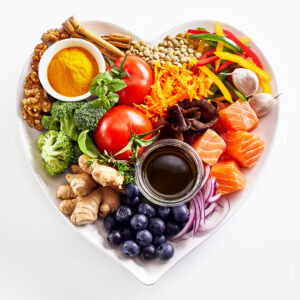Nutrition’s Role in Orthopedic Injury Recovery

Recovering from an orthopedic injury or surgery can be challenging. While medical treatment and physical therapy are critical to your healing journey, proper nutrition can support and speed up your rehabilitation. Orlin & Cohen’s licensed physical therapists, Bryan Baracaldo, PT, DPT, and Samantha Speziale, PT, DPT, explain the two phases of recovery and nutritional considerations, including what to eat and foods to avoid.
Phases of Recovery & Nutrition
Recovery is divided into two distinct phases, the early or acute phase, and the late or rehabilitation phase. Throughout both stages, diet plays a crucial role in giving your body the nutrients it needs to heal.
Early Phase Recovery
After an orthopedic injury or surgery, your initial treatment may require rest and medication. The medications prescribed by your doctor may have side effects like drowsiness and constipation, and while rest promotes healing, it can lead to a loss of muscle mass and strength.
Thankfully, proper nutrition can offset some of these side effects, reduce inflammation, minimize muscle loss, support digestion, and heal wounds. Read on to learn which foods can optimize your recovery.
Carbohydrates
During early recovery, your body’s metabolism increases its energy demands to protect against tissue damage and maintain organ function. Carbohydrates are critical during this stage and are a primary source of energy for your brain, nervous system, and all muscle groups – all key to healing.
There are two different forms of carbs: simple and complex. Knowing the difference between them and understanding their benefits can enhance your recovery.
Simple carbohydrates
Simple carbohydrates are easier and faster for the body to digest, providing the body with energy quicker. However, some simple carbs lack essential nutrients, so it’s helpful to know what to look out for:
- “Good” simple carbs, found in fruit and dairy, include vitamins, minerals, antioxidants, protein, and fiber, which promote tissue repair, immune support, digestive health, and energy. Be sure to include plentiful amounts in your diet.
- “Bad” simple carbs, like those found in junk foods like candy, sugar, syrup, and soda, have little to no nutritional value and can negatively impact your recovery. These foods can lead to inflammation, blood sugar spikes and crashes, weight gain, and more. Limit these foods as much as possible.
Complex carbohydrates
Complex carbohydrates take longer to digest, providing a longer, more sustainable energy source for the body. Complex carbohydrates are broken down into two groups:
Fiber
One type of complex carbohydrate is fiber, a plant-derived food that our digestive system cannot fully break down. Fiber can be found in vegetables, fruits, beans, nuts, and whole grains. Foods high in fiber promote healthy digestion and can help combat constipation, a frequent effect of prescribed medications and pain medicine, in particular.
Starch
Chemically produced by all green plants, starch provides your body energy when digested. High-quality starches include whole-grain bread, brown rice, quinoa, whole-grain pasta, whole-grain cereals, oats, potatoes, peas, and corn.
Foods that decrease inflammation
Inflammation at the site of an injury or surgical procedure is common during the early recovery phase. Eating foods with anti-inflammatory properties can ease this swelling, relieving pain and stiffness and improving your recovery. Some foods that lower inflammation are:
- Fruits and vegetables
- Legumes
- Whole grains
- Fatty fish containing high levels of omega-3, including salmon, mackerel, halibut, sardines, and fresh tuna
- Plant foods rich in omega-3 fats like walnuts, flaxseed oil, and canola oil
Choose protein-rich foods
Incorporating protein-rich foods into your diet can prevent muscle loss, a common side effect of the rest period most are advised to take during early recovery. High-quality proteins include:
- Eggs, egg whites, and egg substitutes
- Low-fat cheese
- Low-fat yogurt
- Lean meats like beef, pork, poultry, and lamb
- Fish
- Soy-based foods, such as tofu, tempeh, miso, soy nuts, and soy vegetable protein
Phase 2 Recovery: Late-Phase Rehabilitation
When your doctor or healthcare professional gives you the green light to resume light physical activity, you’ve likely entered the second recovery phase. This stage focuses on physical rehabilitation, rebuilding muscle strength, functionality, range of movement, and control. Learn more about essential nutrients and foods to support your late-phase recovery below.
High-quality proteins
High-quality proteins are the building blocks of muscle growth and promote wound healing and bone repair – making them essential to rehabilitation. You can find these proteins in meat-based foods, like eggs, poultry, fish, and lean beef. However, plenty of plant-based, vegetarian protein options exist, including quinoa, lentils, almonds, and cottage cheese.
Zinc & vitamin C
Zinc and Vitamin C are powerful nutrients that promote healing in tendons, ligaments, bones, and skin. Foods high in zinc include whole grains, legumes, nuts, and meat products. Foods rich in Vitamin C include fruits and vegetables, like strawberries, kiwis, broccoli, and bell peppers. Including these foods during the late phase of recovery helps maintain a healthier musculoskeletal system.
Vitamin D & calcium
Vitamin D and calcium are essential for bone health and tissue repair, making them critical nutrients for recovery. Choose low-fat dairy foods, dark leafy greens, and calcium-fortified options, like orange juice.
Foods to Avoid or Limit During Recovery & Rehabilitation
In the same way specific foods support and improve your rehabilitation, some can interfere with and even work against your recovery. Here are some foods you should limit or avoid altogether:
- “Bad” simple carbs, like candy, sugar, and junk food, which, as noted above, can contribute to inflammation and energy crashes.
- Ultra-processed foods high in sugar can weaken your immune system and interfere with healing.
- Fried fatty foods are linked to increased levels of inflammation and often lead to weight gain, especially during periods of inactivity and rest during recovery.
- Alcohol often interferes with nutrient absorption, sleep, and immune system performance. It’s wise to avoid it during your recovery.
A thoughtful approach to diet and nutrition during your recovery from an orthopedic injury or surgery can make a big difference. If you’re struggling with an injury or experiencing orthopedic pain, Orlin & Cohen can help. Our team of experienced orthopedic specialists takes a comprehensive approach to orthopedic care. Working closely with our in-house diagnostic team, your doctor carefully evaluates your condition to develop a customized treatment plan, which may include physical therapy or pain management.
Take the first step toward an active life, free from pain. Request a same-day appointment.



